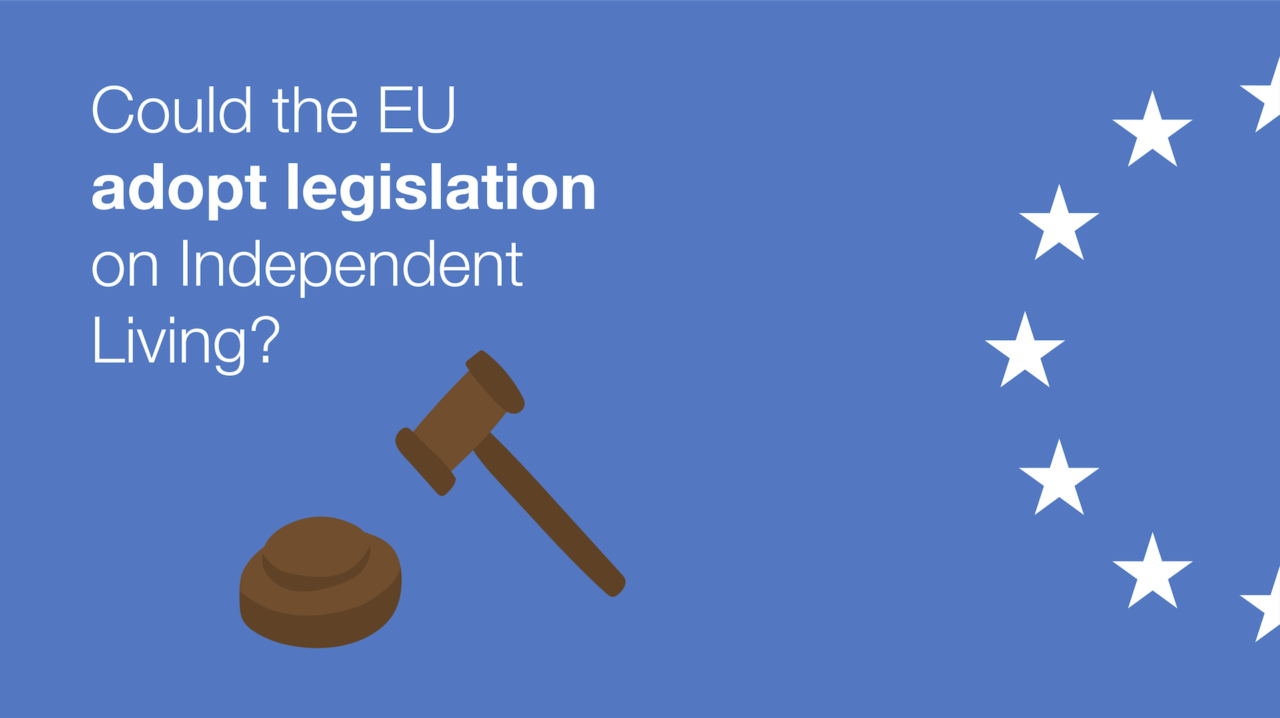The EU has adopted an impressive body of disability legislation which is essential to implement the UN CRPD. Provisions from the EU treaties, the EU Charter of Fundamental Rights and the Guidelines on Deinstitutionalisation, including in emergencies, could grant competences to legislate on Independent Living.
By Florian Sanden, florian.sanden@enil.eu
It is often claimed that the EU has little competence to adopt legislation in the area of disability. Yet, there is the Employment Equality Directive of 2000, the European Accessibility Act of 2019 and the directive establishing the European Disability Card and the European Parking Card of 2024. It is important not to forget the general equal treatment directive which is being debated in the EU Council now, after having been in the legislative freezer since 2008. Last but not least, the proposal for a regulation on the protection of vulnerable adults in cross-border situations must be mentioned.
Why we need legislation on disability
The United Nations Convention on the Rights of Persons with Disabilities (UNCRPD) has no direct effect on individual citizens and is too vague for courts and authorities to work with. That was decided by a ruling of the Court of Justice of the European Union (CJEU, 2014, 90) in 2014:
“…it must be held that the provisions of that Convention are not, as regards their content, provisions that are unconditional and sufficiently precise … and that they therefore do not have direct effect in European Union law.“
Adopting legislation is thus essential, if we want to implement the convention. Last but not least, it was Adolf Ratzka who called for the conversion of the UN CRPD articles into European Union directives.
The EU acquis on disability in detail
The Employment Equality Directive for the first time introduced EU-wide minimum standards against discrimination of disabled people at work. Especially the concept of reasonable accommodation was innovative at the time (Waddington 2000). The European Accessibility Act brought us minimum accessibility standards that all Member States have to provide for example in the digital realm. The European Disability Card and the European Parking will facilitate short term visits and long-term stays with an education purpose in other EU countries.
In 2008, the European Commission proposed a directive to implement the principle of equal treatment which if adopted would prohibit discrimination in the areas of social protection, including social security and healthcare; education; and access to goods and services, including housing.
The proposal for a regulation on the protection of vulnerable adults is proposing rules for the automatic recognition of deprivations of legal capacity when a disabled person moves to another EU country. ENIL is conducting lobby activities to change the content of this piece of legislation, to transform it into a regulation in support of supported decision making.
Disability in EU primary law
Much of the EU´s competences in the area of disability stem from article 19 of the Treaty of the Functioning of the European Union, which as primary law guides all legislative activity. It states the following:
“Without prejudice to the other provisions of the Treaties and within the limits of the powers conferred by them upon the Union, the Council, acting unanimously in accordance with a special legislative procedure and after obtaining the consent of the European Parliament, may take appropriate action to combat discrimination based on sex, racial or ethnic origin, religion or belief, disability, age or sexual orientation.”
It can´t be doubted that the EU has strong competences to adopt binding legislation in the area of disability. Does the Union also have the competences to legislate on the core topics of Independent Living, especially deinstitutionalization and personal assistance? It very well could.
With the Lisbon Treaty which came into force in 2009, the EU Charter of Fundamental Rights acquired the same legal values as the Treaties, obliging the EU to comply with the Charter in all its activities (Waddington 2011). Article 26 of the Charter states that “the Union recognizes and respects the rights of persons with disabilities to benefit from measures designed to ensure their independence, social and occupational integration and participation in the life of the community”.
EU legislation on disability and the UN CRPD
The EU is state party to the UN CRPD. The Union is thus obliged to adjust its legal acquis so that disabled people can enjoy all the rights promised in the convention. A core idea of the UN CRPD is that disabled people have rights on an equal level with others. If they don´t, they are being discriminated against. Being institutionalized means that someone is severely restricted in their access to enjoying all the other rights. Institutionalisation constituting discrimnination is thus a logical conclusion.
In 2022 the Guidelines on Deinstitutionalisation, including in emergencies, confirmed this interpretation. The document states that: “Institutionalization is a discriminatory practice against persons with disabilities, contrary to article 5 of the Convention“.
The Committee on the Rights of Persons with Disabilities has the competence to produce general comments and guidelines to add substance to the articles of the UN CRPD. According to Markus Schäfer of the committee, state parties have to take General Comments and Guidelines into account when implementing the UN CRPD. In addition, articles 26 and 31 of the Vienna Convention on the Law of Treaties established a general duty of loyalty when it comes to implementing international treaties.
EU primary law takes precedence over the UN CRPD (Waddington 2016, p 479). However, since the EU treaty allows to legislate against discrimination, it follows that the Union should follow-up of the interpretation of the Convention expressed in the Guidelines of DI. According to legal scholar Lisa Waddington, the phrase “take appropriate action to combat discrimination” suggests that article 19 allows the Community to take active measures and adopt formal rules (Waddington 1999).
Before signing the UN CRPD, the EU Institutions produced a Code of Conduct on how to distribute the competences for implementing the various articles of the Convention. The Code of Conduct contains a list of existing legislative acts, which give the Union competences in an area. Nine acts are identified from the area of independent living and social inclusion.
In many countries, the financing of institutions and personal assistance is regulated through social security legislation. Article 153 of the TFEU states that “…the Union shall support and complement the activities of the Member States in the following fields:
c) social security and social protection of workers.”
Disabled people are kept from work due to discrimination. Not counting them as workers too, would constitute discrimination. A directive always leaves a lot of leeway for member states to implement according to the national context. A directive on Independent Living could thus be seen as supporting and complementing.
Changing the Treaty and expanding competences
During the Freedom Drives it always becomes clear that disabled people expect the European Union to act, to improve Independent Living in their countries. In a democracy the legal competences of any given political body can be changes, expanded or restricted. The Code of Conduct governing the division of competences between the EU and its Member States, states:
“The union institutions and the Member states will ensure close cooperation in the implementation of the convention… bearing in mind that the scope and exercise of the union’s competences are, by their nature, subject to continuous development.”
Should legal experts conclude that the EU does indeed not have the competence to legislation on Independent Living the route is clear. We must lobby for a change in the division of competences or a change of the EU treaty. During the euro crisis, the European Stability Mechanism was founded overnight and supplied with a budget of EUR 700 bn. Where there is a political will anything is possible from a legal point of view.
Conclusion
The European Union has strong competences to adopt legislation in the area of disability. We need to use these competences to implement the UN CRPD through the adoption of regulations and directives. Reading EU primary law in conjunction with the UN CRPD and the CRPD Guidelines indicates that there are competences to adopt legislation on Independent Living, notably deinstitutionalization and personal assistance. Competences of political bodies can be changed, radically if need be. If we want better lives for disabled people, we need to advocate for all legal changes necessary to achieve that objective.



